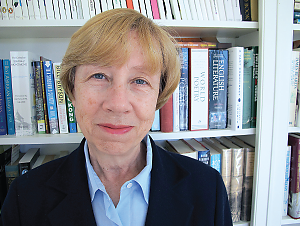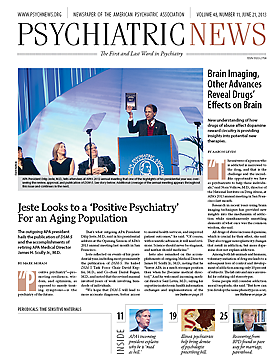Patients who meet criteria for recovery from borderline personality disorder (BPD) are more likely to marry and be parents than those who do not recover, and they are more likely to do so at an older age.
That’s what Mary Zanarini, Ed.D., of McLean Hospital in Belmont, Mass., reported at a symposium on long-term outcome for BPD at APA’s 2013 annual meeting in San Francisco last month. Zanarini—who is one of the leading researchers on BPD—discussed findings from the McLean Adult Development Study (MADS), which looked at marriage stability and parenting as variables in recovery from BPD.
“The study focuses on marriage or living stably with a partner and parenting because they are two of the main markers of successful adult adaptation,” Zanarini told Psychiatric News prior to the meeting.
In the study, “recovery” from BPD was defined as being symptom-free, having at least one stable close relationship, and being employed.
The MADS was the first NIMH-funded prospective study of the longitudinal course of BPD. It involved 362 McLean inpatients assessed at baseline with eight waves of blind follow-up completed, including 2-, 4-, 6-, 8-, 10-, 12-, 14-, and 16-year data. (Data from the 18-year wave began in July 2010 and from the 20-year wave in July 2012.)
A total of 290 patients met DSM-III-R criteria for BPD. There were 72 Axis II comparison subjects meeting DSM-III-R criteria for another personality disorder but not for BPD.
By the time of the 16-year follow-up, 60 percent of BPD patients had achieved at least a two-year recovery. Interestingly, the failure to meet criteria for recovery was not due to a lack of remission of symptoms; in fact, 99 percent of those with BPD had at least a two-year remission by the time of the 16-year follow-up. Rather, it was the inability to work full time that was the most troublesome aspect of psychosocial functioning, Zanarini reported.
But what are the factors related to recovery?
Zanarini and colleagues found that recovered patients were significantly more likely to marry and have children—but that they tended to do this later in life. Correspondingly, they were less likely to divorce or to give up custody of their children. (She noted at the meeting that when patients did give up custody, it was typically voluntarily—rather than by mandate of the state—because they or family members felt they needed to be hospitalized or were too ill to attend to the children.)
Of recovered BPD patients, 78.7 were ever married or lived together for more than five years compared with just 39.3 of nonrecovered individuals. Average age of marriage or beginning of sustained cohabitation for recovered patients was 29, while the average age of marriage among nonrecovered patients was 25.
More striking, of recovered patients 42.4 percent had divorced, but 74.6 percent of nonrecovered patients had divorced.
Similarly, 49.3 percent of recovered patients had ever had or adopted a child, while only 30.7 percent of nonrecovered patients had. And parenthood, like marriage, tended to occur later in life for recovered patients (average age 29.6) than for nonrecovered individuals (22.6).
Zanarini also reported on factors that were associated with successful marriage and parenting. She found that absence of childhood sexual abuse and higher IQ were the most significant multivariate predictors of stable marriage or cohabitation. The multivariate predictors of stable parenting were higher IQ, absence of a history of drug abuse, and extraversion.
“We found that recovered BPD patients are more likely to marry than those who do not recover,” Zanarini told Psychiatric News. “They marry for the first time at an older age when their lives are settled, and they are less likely to get a divorce. In the area of parenting, they are significantly more likely to have a child or adopt a child. They become a parent at a significantly older age and are less likely to lose or relinquish custody of their children.”
What’s the take-home message? “Clinicians should know that people with BPD can successfully marry or live with a partner in a stable relationship and become parents. But if they do these things while they are still acutely ill and when they are young, it is not as likely to turn out as well as if they wait, symptomatically and psychosocially improve quite a bit, and get a bit older and calmer—[in which case]it is quite likely to turn out well.” ■

